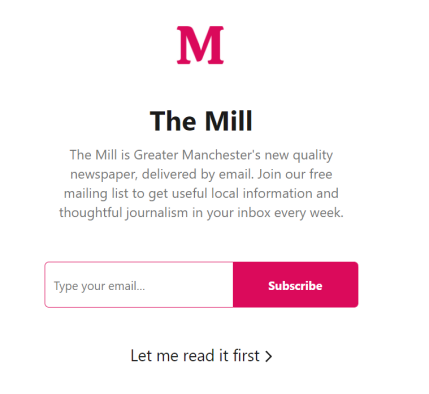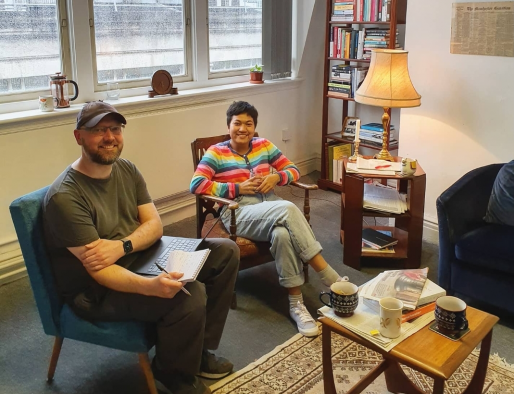
Fledgling local newsletters in Manchester, Sheffield and Liverpool have been given a major boost after receiving funding from the US newsletter platform Substack.
Manchester Mill, Sheffield Tribune and Liverpool Post publisher Joshi Herrmann (pictured) told Press Gazette he hoped to prove readers would pay for “thoughtful and nuanced” local storytelling.
“There is no long-term viable solution to the problems in local journalism that doesn’t come from getting people to pay for local news again,” he said.
Substack awarded $1m to 12 local journalism projects in the UK, US, Australia, Brazil, Nigeria, Romania and Taiwan with the aim of helping them create sustainable enterprises. Cash grants of up to $100,000 each will help support them for the next year.
Substack co-founder Hamish McKenzie said: “The number one problem that local news needs to overcome is the failure of old business models. This is the start of our attempt to foster something new.”
[Read Press Gazette’s Substack profile: The newsletter platform that’s convinced Glenn Greenwald and other high-profile journalists to fly solo]
Herrmann, whose project was the only UK recipient, set up the Manchester Mill in June last year and has since helped launch the Sheffield Tribune.
Dan Hayes left his job as a reporter at JPI Media’s Sheffield Star newspaper to run the Sheffield Tribune, writing that in his six years in journalism his “work has increasingly been judged on how many page views I bring in, not the quality of the stories I write”, and that he wanted to offer a “different kind of reporting”.
Thanks to the Substack funding Herrmann is now looking for a full-time journalist to run the Liverpool Post, which started life late last year as a side project to give readers “the same kind of accurate, clear, calm Covid-19 reporting we were doing in Manchester”.
Recent stories in the Manchester Mill include an examination of how the forces that led to Brexit had been building for decades, and a look at Oldham 20 years after it was the scene of some of Britain’s worst race riots. The Sheffield Tribune has looked at the growth of the Green Party following May’s elections.

Herrmann told Press Gazette he launched The Mill, which is marking the anniversary of its first newsletter this weekend, to find out “whether you could build a high-quality local news outlet that was funded by subscriptions primarily”.
“I thought there was a demand for that, there was a need for it, because regional newspapers and local newspapers have shrunk a lot in the past decade and therefore the types of journalism that they used to publish have been stripped out – the culture writing, the opinion writing, the features, the bits of journalism bringing a lot of richness to people’s lives but that newspapers generally can’t afford to do anymore,” the 32-year-old said.
“So I thought [I could] put together a different kind of local journalism that’s more focused on narrative storytelling and more focused on interviews with people in the places that we cover and more interested in thoughtful, nuanced reporting rather than regular day-to-day news reporting.”
He said The Mill had proved a “good early indicator” of interest in this approach, with 900 people already paying £7 per month since paid subscriptions went live in late September.
People can also sign up to get some stories for free, with almost 13,000 on the email list.
The paying subscribers have enabled Herrmann to hire a full-time journalist and rent office space in Manchester (pictured below).

Sheffield Tribune’s Dan Hayes and Manchester Mill journalist Dani Cole in The Mill’s office in Manchester. Picture: Manchester Mill
“I assumed it would take a couple of years to build up any momentum and become known and actually it’s been amazing how quickly it’s taken off,” he said.
[Read more: 2020 was the year when people rediscovered local news, says Reach audience chief David Higgerson]
Herrmann’s newsletters are new entrants in cities that have major regional news presences in the form of Reach’s Manchester Evening News and Liverpool Echo, and JPI Media’s Sheffield Star.
He sees his brands as adding “more in-depth journalism – more journalism that isn’t based on press releases or social media posts but is actually based on speaking to people, getting documents, taking photographs and documenting what’s happening in these amazing and very different cities”.
Reach is experimenting with asking for payment contributions in a Guardian-style plea on the Liverpool Echo, but has decided not to repeat an earlier micro-paywall experiment; instead, it is focusing on scale and asking readers to register with their email addresses, but keeping its content free across its network.
Meanwhile, JPI’s Sheffield Star now offers five articles per week for free before asking readers to pay.
[Read more: Paywalls, micropayments and donations and how regional press giants are trying to make news pay]
Herrmann – a former Evening Standard features writer who has also written for the Guardian, Times and Telegraph – told Press Gazette: “Over the past decade, when local media companies have said to readers ‘okay, we now want you to pay for something we’ve been giving away for free and it’s still going to have a bunch of ads on it and it’s still going to be on a website that’s almost impossible to read because of the amount of ads and pop ups and clickbait’ – people are not responding well to that.
“If we want people to pay for local news we have to give them a new, higher-quality, differentiated version of local news and a type of local news that has been re-imagined, that has been built for the digital age, that has more of a relationship with readers rather than treating them as a cheap commodity.”
This approach could lead to hundreds of thousands of people in communities around the UK proving willing to pay for local news again, Herrmann said, adding it can clearly work in cities but that local advertising may still need to play a role in smaller towns.
“I would hope that what we’re doing is part of the solution,” he concluded.
“But the haemorrhaging of good journalists from local newspapers is the most urgent common problem in British journalism and in American journalism and in lots of countries, so we need lots of people coming up with lots of solutions, and I think Substack and the membership tools they have and the newsletter tools they have can enable some people to come up with some solutions.”
Email pged@pressgazette.co.uk to point out mistakes, provide story tips or send in a letter for publication on our "Letters Page" blog
